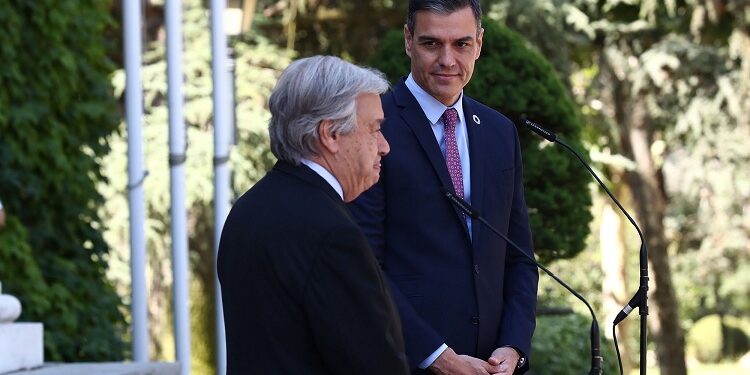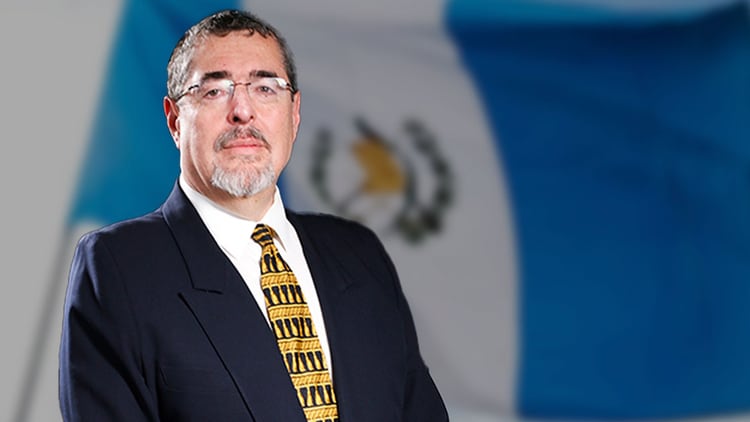Eduardo González
The President of the Government, Pedro Sánchez, yesterday expressed his support for the decision of the UN Secretary General, António Guterres, to invoke Article 99 of the Founding Charter of the United Nations to call for a ceasefire in Gaza. In response to this decision, Israel’s Foreign Minister Eli Cohen declared that the activation of Article 99 and the call for a ceasefire in Gaza “constitute support for the terrorist organization Hamas,” in a tone very similar to the one he used last November 23 against Sánchez for advocating a “lasting ceasefire.”
“The humanitarian catastrophe in Gaza is unbearable,” Sánchez declared via his official account on the social network X. “I convey my full support to UN Secretary General António Guterres in his invocation of Article 99 of the UN Charter,” he continued. “I fully share his reasons for appealing to the Security Council,” because “faced with the risk of imminent collapse of the humanitarian situation in Gaza, the Security Council must act immediately and impose a humanitarian cease-fire,” he added.
For his part, EU High Representative for Foreign and Security Policy Josep Borrell called on “EU members of the UN Security Council (France) and like-minded partners to support UN Secretary-General António Guterres call”. “The UN Security Council must act immediately to prevent a full collapse of the humanitarian situation in Gaza,” he warned.
This is the first time António Guterres has convened Article 99, which states that the UN secretary-general “may call the Council’s attention to any matter which in his opinion may threaten the maintenance of peace and security in the world.”
Specifically, the Portuguese diplomat has made this appeal to the rotating president of the Security Council – the new ambassador of Ecuador to the United Nations, José Javier de la Gasca – in which he asks the International Community to use “all its influence to prevent further escalation and end the crisis” in Gaza. “I urge the members of the Security Council to press to avert a humanitarian catastrophe,” reads the letter sent to De la Gasca, in which he also called for “a humanitarian ceasefire” that would allow “the means of survival can be restored, and humanitarian assistance can be delivered in a safe and timely manner across the Gaza Strip.”
According to the Secretary-General, since the “brutal” killing of 1,200 people and the abduction of 200 people by the “abhorrent acts of terrorism by Hamas and other Palestinian armed groups,” which marked two months yesterday, Israel’s military response in the Gaza Strip has resulted in the deaths of “more than 15,000 people.” “More than half of aal homes have been destroyed, some 80 percent of the population on 2.2 million have been forcibly displaced (…) and more than 1.1 million people have sought refuge in UNRWA (the UN agency for aid to Palestinian refugees). “There is no effective protection of civilians,” he denounced.
Israel: “Guterres supports terrorism”
Following Guterres’ decision, Israeli Ambassador to the UN Gilad Erdan yesterday accused the UN secretary general of having reached a “new level of moral turpitude.” “The secretary-general’s call for a cease-fire is, in reality, a call to maintain Hamas’ reign of terror in Gaza,” he stated via X. Guterres’ words, he added, “only prolong the fighting in Gaza, because they give hope to Hamas terrorists that the war will end and that they will be able to survive.” For his part, Israel’s Foreign Minister Eli Cohen stated via X that the activation of Article 99 and the call for a cease-fire in Gaza “constitute support for the Hamas terrorist organization.”
Israel rejects the cease-fire on the grounds that it would only contribute to rearming and strengthening Hamas. In fact, Cohen’s words against Guterres are reminiscent of those he himself declared against Pedro Sánchez last November 23 after the President of the Government defended at the Rafah crossing, during his tour of the Middle East, “a lasting ceasefire” in the Gaza Strip. This incident resulted in the mutual summoning of the ambassadors of the two countries and, five days later, in the decision of Benjamin Netanyahu’s government to recall the Israeli ambassador in Madrid, Rodica Radian-Gordon, for other words of Sanchez in which he questioned Israel’s willingness to apply international humanitarian law in Gaza.
In these two months, the Security Council has met on several occasions to discuss the Gaza war, but any decision has been frustrated by the vetoes (usually at cross-purposes) of the United States, Russia and China. Last November 15, the Council was able to agree on a call for “humanitarian pauses” (rather than a cease-fire), but nothing has been finalized. Israel has responded harshly to all UN appeals. Last October, the Israeli government blocked the granting of visas to UN representatives and called for the resignation of Guterres.







